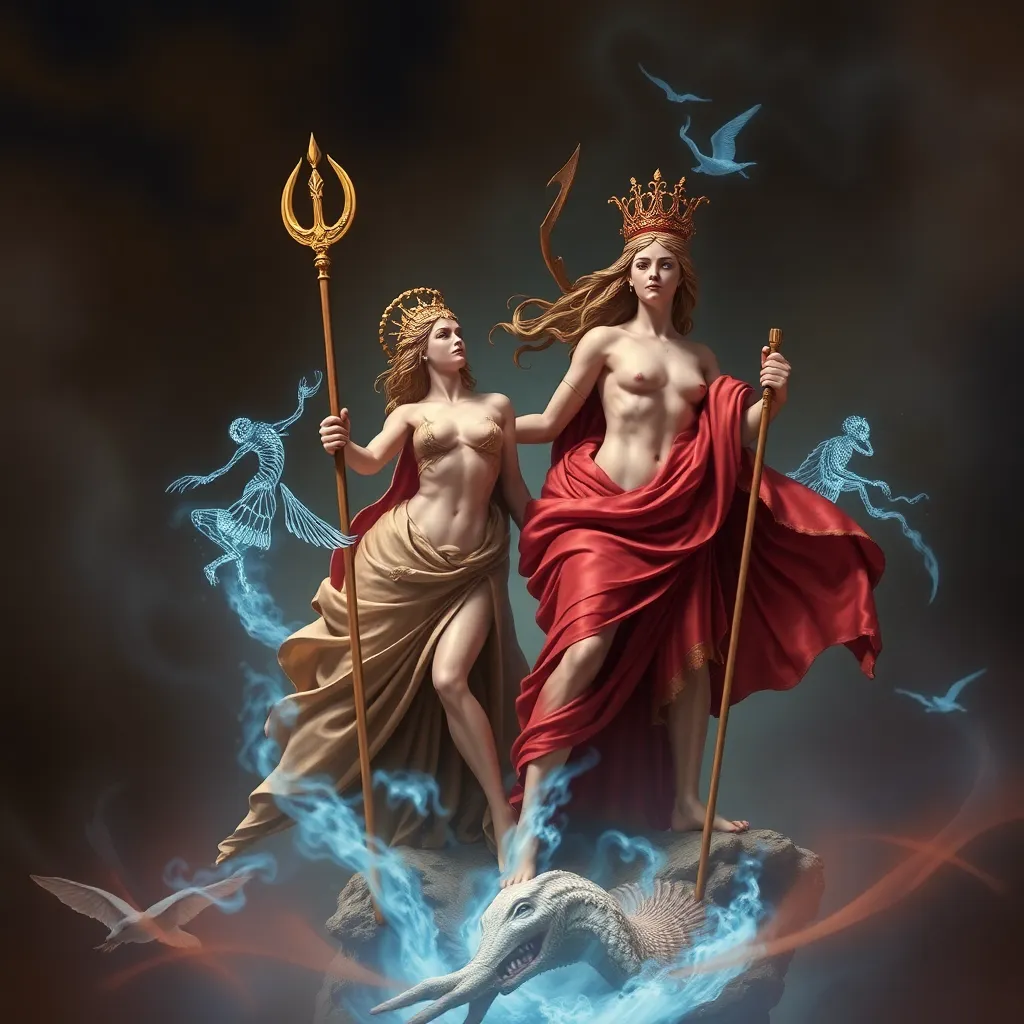The Myths of Hera and the Concept of Divine Retribution
Introduction to Hera: The Queen of the Gods
In Greek mythology, Hera stands as the majestic Queen of the Gods, revered for her beauty, power, and fierce temperament. As the wife of Zeus, the king of the gods, she plays a significant role in many mythological tales, often embodying the themes of jealousy, vengeance, and justice. Hera’s character not only reflects her stature as a goddess but also serves as a pivotal figure in the concept of divine retribution, where she punishes both mortals and gods alike for their wrongdoings. Her relentless pursuit of justice—often motivated by personal grievances—highlights the complexities of her character and the moral fabric of Greek mythology.
The Origins of Hera: Birth and Marriage to Zeus
Hera was born to the Titans Cronus and Rhea, making her one of the elder Olympian deities. She is often referred to as the goddess of marriage and family, symbolizing the sanctity of these institutions. Her marriage to Zeus, however, was anything but idyllic. Zeus, known for his numerous affairs and escapades, frequently betrayed Hera’s trust, leading to a tumultuous relationship fraught with jealousy and revenge.
The implications of Hera’s marriage to Zeus are profound. As his wife, she held a position of power, yet she was constantly challenged by his infidelities. This dynamic shaped Hera’s character and motivated her actions, resulting in a legacy filled with tales of divine retribution against those who wronged her or crossed her path.
Key Myths Involving Hera: A Study in Retribution
Hera’s myths are rich with themes of vengeance and justice. Some of the most notable stories include:
- The Twelve Labors of Heracles: Hera’s relentless hatred for Heracles, the son of Zeus and the mortal Alcmena, stems from his very existence. She sent serpents to kill him as an infant and later instigated his madness, leading to his tragic slaying of his own family.
- The Trojan War: Hera played a crucial role in the events leading to the Trojan War, driven by her desire for revenge against Paris, who had slighted her in favor of Aphrodite. Her involvement in the war illustrates her deep-seated need to assert her power and deliver divine retribution.
These myths exemplify Hera’s complex nature, revealing her as both a protector of marriage and a vengeful goddess who does not tolerate betrayal.
Hera’s Jealousy: The Catalyst for Divine Retribution
Hera’s jealousy is perhaps one of her defining traits. Her wrath is predominantly directed towards Zeus’s numerous lovers and their progeny. This jealousy often manifests in harsh punishments for both the mortals involved and their offspring. Notable case studies include:
- Io: When Zeus fell in love with Io, a mortal priestess, Hera transformed her into a heifer to hide her from Zeus. This act of jealousy led to Io’s endless suffering at the hands of the tormenting gadfly sent by Hera.
- Leto: Hera’s jealousy towards Leto, the mother of Apollo and Artemis, was so intense that she forbade her from giving birth on solid ground. This forced Leto to find refuge on the floating island of Delos, highlighting Hera’s vindictive nature.
These stories demonstrate how Hera’s jealousy catalyzed her actions, often resulting in severe consequences for those who crossed her.
The Role of Divine Retribution in Greek Mythology
Divine retribution in Greek mythology refers to the punishment inflicted by the gods on mortals who violate moral laws or fail to honor the divine. In the context of Hera, her retribution serves to maintain cosmic order and uphold her dignity as a goddess. Key aspects include:
- Definition: Divine retribution is a moral response to wrongdoing, often leading to severe consequences for the offender.
- Significance: It reflects the ancient Greek belief in justice, where the gods actively intervened to correct moral imbalances.
Hera’s methods of retribution, while sometimes brutal, are not unique among the deities. Other gods also enacted vengeance, but Hera’s personal motivations often add a layer of complexity to her actions.
Hera as a Symbol of Female Power and Agency
Hera’s actions, while often viewed through the lens of jealousy, also serve as a powerful statement on female agency within a patriarchal society. By exacting revenge, Hera asserts her power and challenges the traditional gender roles often found in myths. Key points to consider:
- Challenge to Gender Roles: Hera’s fierce retribution against her husband’s infidelities positions her as a formidable figure who does not passively accept her circumstances.
- Agency through Retribution: Hera’s wrath can be interpreted as a form of agency, taking control of her narrative and asserting her will in a male-dominated pantheon.
Her story serves as a reflection of the struggles faced by women in both myth and reality, allowing for a broader discussion on power and justice.
Modern Interpretations of Hera and Divine Retribution
Contemporary literature and media have revisited Hera’s character, often portraying her in a more nuanced light. Modern interpretations explore her motivations and the complexities of her relationships. Notable trends include:
- Reinterpretation in Literature: Many authors have reimagined Hera’s character, giving her depth and exploring her feelings of betrayal and anger.
- Media Representation: Films and television shows often depict Hera as a multifaceted character, focusing on her struggles and resilience rather than solely her vengeance.
These modern portrayals resonate with contemporary discussions of justice and morality, allowing Hera’s stories to remain relevant in today’s society.
Conclusion: The Enduring Legacy of Hera’s Myths
Hera’s impact on mythology and culture is profound. Her stories serve as cautionary tales about the consequences of betrayal and the complexities of justice. They invite reflection on the nature of power, retribution, and the roles of women in mythology. Despite her often-villainous portrayal, Hera embodies a rich tapestry of emotions and motivations that continue to resonate with audiences today. The lessons learned from her tales regarding justice, agency, and the intricacies of love and loyalty remain significant in both ancient and modern contexts.




